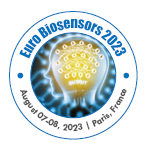Nanotechnology in Biosensors
Nanotechnology is pretending an increasingly important role in the expansion of biosensors. Biosensors frequently comprise a biological recognition molecule immobilized onto the surface of a signal transducer to give a solid state analytical device. The use of nanomaterial’s has acknowledged the establishment of many new signal transduction technologies in biosensors through nanotechnology. Nanolithography is the branch of nanotechnology afflicted with the study and application of the nanofabrication of nanometer-scale structures, meaning Nano patterning with at least one lateral dimension between the size of an individual atom and generally 100 nm. Nanosensors are chemical or mechanical sensors that can be used to detect the presence of chemical species and nanoparticles, or monitor physical parameters such as temperature, on the Nano scale. Nano photonics is the new emerging paradigm where light interacts with Nano-scaled structures and brings forth the mysterious world to research.
- Nanobiosensors, nanomaterials & nanoanalytical systems
- Nanolithography
- Nanobioelectronics
- Nanopolymers
- Novel approaches of nanoparticles in sensing
- Nano materials and Nano analytical systems
- Nanophotonics/THz sensing
- Nanorobotics
- Nano bio computing
- Nanotheranostics
Related Conference of Nanotechnology in Biosensors
Nanotechnology in Biosensors Conference Speakers
Recommended Sessions
- Bio-MEMS/NEMS
- Biochips & Nucleic Acid Sensors
- Bioelectronics
- Bioinstrumentation & Equipments
- Biosensing Technologies
- Biosensor Applications
- Biosensors
- Biosensors & Global Market
- Biosensors for Imaging
- Environmental Biosensors
- Enzyme-based biosensors
- Nanotechnology in Biosensors
- Photonic Sensor Technologies
- Transducers in Biosensors
- Types of Biosensors
Related Journals
Are you interested in
- 3D Structure Determination - Structural Biology-2026 (France)
- Advanced Drug Delivery Systems for Metabolic Therapy - DRUG CHEMISTRY CONF 2026 (France)
- Advanced Techniques in Structural Biology - Structural Biology-2026 (France)
- AI & Computational Structural Biology - Structural Biology-2026 (France)
- Biochemistry and Biophysics - Structural Biology-2026 (France)
- Biomarker-Guided Drug Development - DRUG CHEMISTRY CONF 2026 (France)
- Chemical Biology Tools in Metabolic Research - DRUG CHEMISTRY CONF 2026 (France)
- Computational Approach in Structural Biology - Structural Biology-2026 (France)
- Computational Drug Design and Molecular Modeling - DRUG CHEMISTRY CONF 2026 (France)
- Drug Designing and Biomarkers - Structural Biology-2026 (France)
- Drug Resistance and Therapeutic Durability - DRUG CHEMISTRY CONF 2026 (France)
- Enzyme Modulation Approaches in Antidiabetic Drug Design - DRUG CHEMISTRY CONF 2026 (France)
- Epigenetic Regulation and Small-Molecule Therapeutics - DRUG CHEMISTRY CONF 2026 (France)
- Future Directions in Drug Chemistry for Diabetes Management - DRUG CHEMISTRY CONF 2026 (France)
- Hybrid Approaches for Structure Prediction - Structural Biology-2026 (France)
- Lipid Chemistry and Metabolic Regulation - DRUG CHEMISTRY CONF 2026 (France)
- Medicinal Chemistry Strategies for Metabolic Disorders - DRUG CHEMISTRY CONF 2026 (France)
- Membrane Proteins and Receptors - Structural Biology-2026 (France)
- Molecular Modelling and Dynamics - Structural Biology-2026 (France)
- Natural Product Chemistry in Diabetes Drug Discovery - DRUG CHEMISTRY CONF 2026 (France)
- Oxidative Stress Modulation through Drug Chemistry - DRUG CHEMISTRY CONF 2026 (France)
- Peptide and Protein-Based Drug Chemistry - DRUG CHEMISTRY CONF 2026 (France)
- Pharmacokinetics and Drug Metabolism Studies - DRUG CHEMISTRY CONF 2026 (France)
- Prodrug Design and Chemical Activation Strategies - DRUG CHEMISTRY CONF 2026 (France)
- Proteomics and Genomics - Structural Biology-2026 (France)
- Regulatory Chemistry and Drug Safety Assessment - DRUG CHEMISTRY CONF 2026 (France)
- Structural Bioinformatics and Computational Biology - Structural Biology-2026 (France)
- Structural Biology in Cancer Research - Structural Biology-2026 (France)
- Structural Virology - Structural Biology-2026 (France)
- Structural Virology and Infectious Diseases - Structural Biology-2026 (France)
- Structure-Based Drug Discovery - Structural Biology-2026 (France)
- Structure-Based Solutions to Global Health Challenges - Structural Biology-2026 (France)
- Structure-Function Relationships - Structural Biology-2026 (France)
- Structure–Activity Relationship Studies in Drug Chemistry - DRUG CHEMISTRY CONF 2026 (France)
- Synthetic Chemistry Innovations in Drug Development - DRUG CHEMISTRY CONF 2026 (France)
- Targeting Pancreatic Function through Drug Chemistry - DRUG CHEMISTRY CONF 2026 (France)
- The Structural Basis of Disease - Structural Biology-2026 (France)
- Translational Drug Chemistry from Bench to Clinic - DRUG CHEMISTRY CONF 2026 (France)

